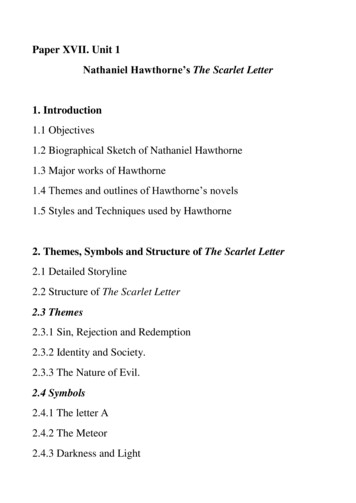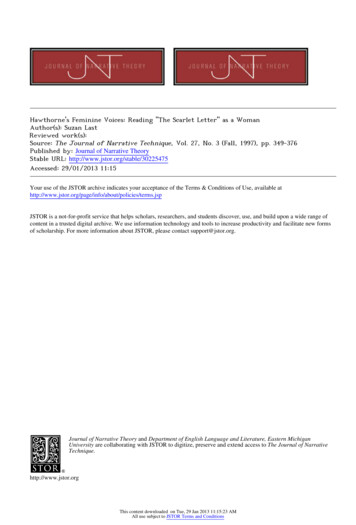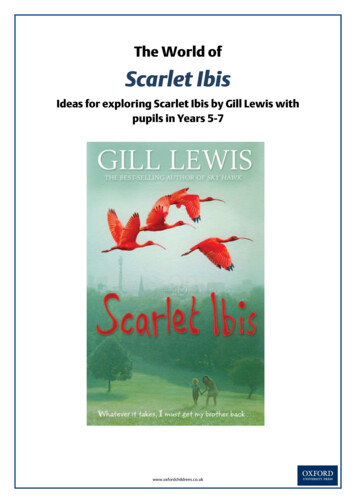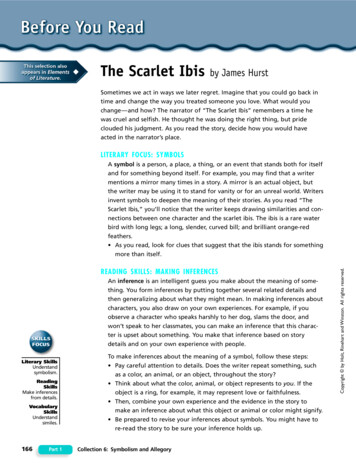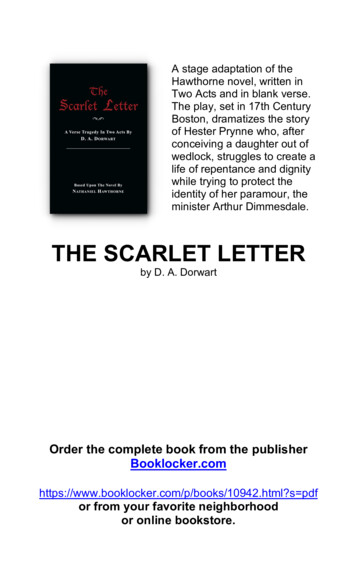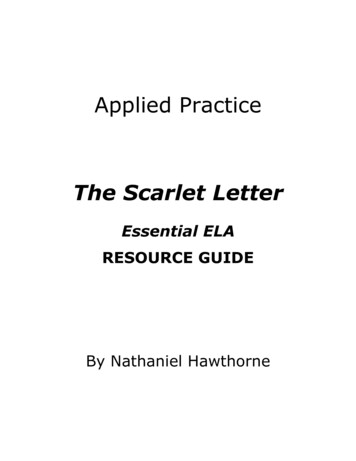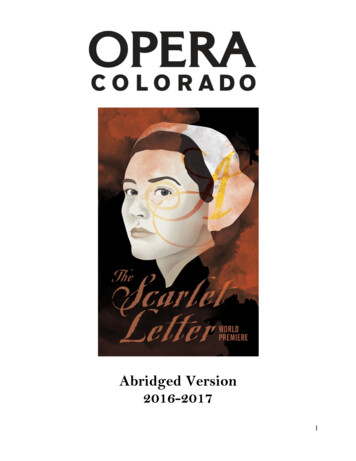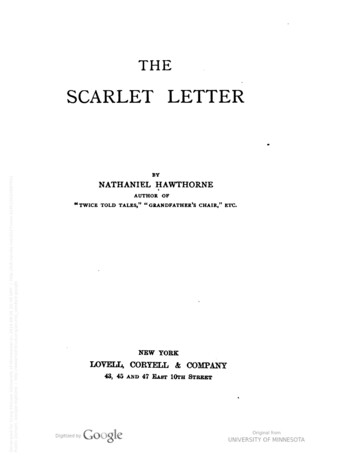
Transcription
THESCARLET LETTERBYNATHANIEL HAWTHORNEAUTHOROF“TWICE TOLD TALES," “GRANDFATHER'SCHAIR," ETC.NEW YORKLOVELL, CORYELL43,45 AND 47&COMPANYEAST 10TH STREET
imHBIC9cC0 N T E N T S.PAGETHE CUSTOM-HOUSE. — INTRODUCTORY.5.57.59.72.84.93THE SCARLET II.XIII.XIV.'XV.THE PnIsON-Doon.THE MARKET—PLACETHE RECOGNITIONTIIE INTERVIEW.PEARL.105HALL.118THE ELF—CHILD AND TIIE MINISTER.127THE LEEOH.139.152.165.174.189HESTER AND THE PHYSICIAN.200HEsrEn AND PEARL.208.217.225.'I‘IIE GOVERNOR’S.XX.XXI.XXII.XXIII.XXIV.ANOTHERVIEwOF HESTERPAmsnIONEEFLOOD 0F SUNSHINE.237THE CHILD AT THE BROOK—SIDE.245TIIE MINISTER IN A MAZE.254.268.280LETTER.294.305.TIIE PROCESSIONTIIE REvELATIONCONCLUSION.30‘“.OF THE SCARLET.U M3mm71482669l.THE NEW ENGLAND HOLIDAY3AUG.'I‘IIE LEECII AND HIS PATIENTTIIE INTERIOR or A HEART .THE MINISTER’B VIOIL .XVIII. AXIX.-HESTEB AT HER NEEDLE.XVI. A FOREST WALKXVII. TEE PASTOR AND HE‘.
THE CUSTOM-HOUSE.INTRODUCTORY To “THE SCARLET LETTER.”ITis a little remarkable, that— though disinclinedto talk overmuch of myself and my affairs at the fireside, and to my personal friends —- an autobiographicalimpulse should twice in my life have taken possessionof me, in addressing the public.The first time wasthree or four years since, when I favored the reader—inexcusably, and for no earthly reason, that either theindulgent reader or the intrusive author could imagine—with a description of my way of life in the deepAnd now—because, bequietude of an Old Manse.yond my deserts, I was happy enough to find a listeneror two on the former occasion—I again seize the public by the button, and talk of my three years" experience in a Custom-House.The example of the famous“P. P., Clerkof this Parish,” was never more faithfully followed. The truth seems to be, however, that,when he casts his leaves forth upon the wind, theauthor addresses, not the many who will fling aside hisvolume, or never take it up, but the few who willunderstand him, better than most of his schoolmates orlifemates.Some authors, indeed, do far more than;this, and indulge themselves in such confidential depths5
THE SCARLET LETTER.6of revelation as could fittingly be addressed, only andexclusively, to the one heart and mind of perfect sympathy; as if the printed book, thrown at large on thewide world, were certain to find out the divided segment of the writer’s own nature, and complete hiscircle of existence by bringing him into communionwith it. It is scarcely decorous, however, to speak all,But, as thoughtseven where vwe speak impersonally.are frozen and utterance benumbed,unless the speakerstand in some true relation with his audience, it maybe pardonable to imagine that a friend, a kind andapprehensive, though not the closest friend, is listeningto our talk; and then, a native reserve being thawedby this genial consciousness, we may prate of the circumstances that lie around us, and even of ourself, butstill keep the inmost Me behind its veil. To thisextent, and within these limits, an author, methinks,may be autobiographical, without violating either thereader’s rights or his own.It willlikewise, that this Custom-Housesketch has a certain propriety, of a kind always recognized in literature, as explaining how a large portionof the following pages came into my possession, and asoffering proofs of the authenticity of a narrative thereinThis, in fact, —ardesiire to put myself incontained.be seen,my Atruenpositiomsfiediigr,pr very little more, of themost prolix among the tales that make up my volume,—-this, and no other, is my true reason for assuming apersonal relittionIn accomplishingtfié'main purpose, it has appeared allowable, by a fewextra touches, to give a faint representation of a modeof life not heretofore described, together with some of‘
THE CUSTOM—HOUSE.7the characters that move in it, among whom the authorhappened to make one.Inmy native town of Salem, at the head of what,half a century ago, in the (lays of old King Derby, wasa bustling wharf, —-but which is now burdened withdecayed wooden warehouses, and exhibits few or nosymptoms of commercial life; except, perhaps, a barkor brig, half-way down its melancholy length, discharging hides; or, nearer at hand, a Nova Scotiaschooner, pitching out her cargo of firewood, ——at thehead, I say, of this dilapidated wharf, which the tideoften overflows, and along which, at the base and inthe rear of the row of buildings, the track of manylanguid years is seen in a border of unthrifty grass,here, with a view from its front windows adown this-not very enlivening prospect, and thence across theharbor, stands a spacious edifice of brick. From theloftiest point of its roof, during precisely three and ahalf hours of each forenoon, floats or droops, in breezeor calm, the banner of the republic; but with the thirteen stripes turned vertically, instead of horizontally,and thus indicating that a civil, and not a military postof Uncle Sam’s government is here established.Itsfront is ornamented with a portico of half a dozenwooden pillars, supporting a balcony, beneath which aflight of wide granite steps descends towards the street.Over the entrance hovers an enormous specimen of theAmerican eagle, with outspread wings, a shield beforeher breast, and, if I recollect aright, a bunch of intermingled thunderbolts and barbed arrows in each claw.5Withthe customary infirmity of temper that character
8THE SCARLET LETTER.izes this unhappy fowl, she appears, by the fierceness ofher beak and eye, and the general truculency of herattitude, to threaten mischief to the inoffensive community; and especially to warn all citizens, careful of,their safety, against intruding on the premises whichNevertheless, vixshe overshadows with her wings.enly as she looks, many people are seeking at this verymoment, to shelter themselves under the wing of the'federal eagle; imagining, I presume, that her bosomhas all the softness and snugness of an cider-downBut she has no great tenderness, even in herpillow.best of moods, and, sooner or later,—oftener soonthan late, — is apt to fling off her nestlings, with ascratch of her claw, a dab of her beak, or a ranklingwound from her barbed arrows.The pavement round about the above-described edifice — which we may as well name at once as the Custom-House of the port -— has grass enough growing inits chinks to show that it has not, of late days, beenInworn by any multitudinous resort of business.some months of the year, however, there often chancesa forenoon when affairs move onward with a liveliertread. Such occasions might remind the elderly citizenof that period before the last war with England, whenSalem was a port by itself; not scorned, as she is now,by her own merchants and ship-owners, who permit herwharves to crumble to ruin, While their ventures go toswell, needlessly and imperceptibly, the mighty floodof commerce at New York or Boston.On some suchmorning, when three or four vessels happen to havearrived at once, —— usually from Africa or South America, -— or to be on the verge of their departure thitherl/lll,
THE CUSTOM—HOUSE.9ward, there is a sound of frequent feet, passing brisklyHere, before his ownup and down the granite steps.wife has greeted him, you may greet the sea-flushedshipmaster, just in port, with his vessel’s papers underHere, too, comes hishis arm, in a tarnished tin box.owner, cheerful or sombre, gracious or in the sulks,accordingly as his scheme of the now accomplishedvoyage has been realized in merchandise that willreadily be turned to gold, or has buried him under abulk of incommodities, such as nobody will care to ridhim of. Here, likewise,——the germ of the wrinklebrowed, grizzly-bearded,care worn merchant, — wehave the smart young clerk, who gets the taste of trafficas a wolf-cub does of blood, and already sends adventures in his master’s ships, when he had better be sailAnother figure inmill-pond.the scene is the outward-bound sailor in quest of a protection; or the recently arrived one, pale and feeble,seeking a passport to the hospital. Nor must we forgetthe captains of the rusty little schooners that bringfirewood from the British provinces; a rough-lookingset of tarpaulins, without the alertness of the Yankeeaspect, but contributing an item of no slight importanceing mimic-boats uponato our decaying trade.Cluster all these individuals together,they sometimes were, with other miscellaneous ones to diversifythe group, and, for the time being, it made the CustomHouse a stirring scene.More frequently, however, onascending the steps, you would discern— in the entry,if it were summer time, or in their appropriate rooms,if wintry or inclement weather—a row of venerablefigures, sitting in old-fashioned chairs, which wereas
THE SCARLET LETTER.10mmltipped on their hind legs back against the wall. Oftentimes they were asleep, but occasionally might be heardtalking together, in voices between speech and a snore,and with that lack of energy that distinguishes theoccupants of almshouses and all other human beingswho depend for subsistence on charity, on monopolizedlabor, or anything else, but their own independentexertions. These old gentlemen—seated, like Matthew,at the receipt of customs, but not very liable to besummoned thence, like him, for apostolic errands —- were'Custom-House officers.Furthermore, on the left hand as you enter the frontdoor, is a certain room or office, about fifteen feetsquare, and of a lofty height; with two of its archedwindows commanding 'a view of the aforesaid dilapidated wharf, and the third looking across a narrowAll threelane, and along a portion of Derby Street.give glimpses of the shops of grocers, block-makers,slop-sellers, and ship-chandlers; around the doors ofwhich are generally to be seen, laughing and gossiping,clusters of old salts, and such other wharf-rats as hauntThe room itself is cobthe Wapping of a seaport.webbed, and dingy with old paint; its floor is strewnwith gray sand, in a fashion that has elsewhere falleninto long disuse; and it is easy to conclude, from thegeneral slovenliness of the place, that this is a sanctuary into which womankind, with her tools of magic,Inand mop, has very infrequent access.the way of furniture, there is a stove with a voluminous funnel; an old pine desk, with a three-legged stoolbeside it; two or three wooden-bottom chairs, exceedthebroomingly decrepit and infirm; and-fnot to forget the
'rIIE cusron-nousa.library—on11some shelves, a score or two of volumesof the Acts of Congress, and a bulky Digest of theRevenue Laws. A tin pipe ascends through the ceiling, and forms a medium of vocal communication withother parts of the edifice. And here, some six monthsago, -—pacing from corner to corner, or lounging onthe long-legged stool, with his elbow on the desk, andhis eyes wandering up and down the columns of themorning newspaper, —you might have recognized,honored reader, the same individual who welcomedyou into his cheery little study, where the sunshineglimmered so pleasantly through the willow branches,on the western side of the Old Manse.But now,should you go thither to seek him, you would inquirein vain for the LocofocoThe besom ofSurveyor.reform has swept him out of office; and a worthier successor wears his dignity, and pockets his emoluments.This old town Of Salem—my native place, thoughI have dwelt much away from it, both in boyhood andmaturer years — possesses, or did possess, a hold on myforce of which I have never realizedduring my seasons of actual residence here. Indeed,so far as its physical aspect is concerned, with its flat,unvaried surface, covered chiefly with wooden houses,’f—ew Or none of which pretend to architectural beauty,— its irregularity, which is neither picturesque norquaint, but only tame, -— its long and lazy street,affections,thewearisomely through the whole extent ofthe peninsula, with Gallows Hill and New Guinea atone end, and a view of the almshouse at the other,such being the features of my native town, it would belounging-quiteas reasonableto form a sentimental attachment to
THE SCARLET LETTER.12And yet, though invaridisarranged checker-board.ably happiest elsewhere, there is within me a feelingfor old Salem, which, in lack of a better phrase,mustbe content to call affection.The sentiment is prob—ably assignable to the deep and aged roots which myaIfamily has struck into the soil.Itis now nearly twocenturies and a quarter since the original Briton, theearliest emigrant of my name, made his appearance inthe wild and forest-bordered settlement“ which hassince become a. city. And here his descendants havebeen born and died, and have mingled their earthysubstance with the soil; until no small portion of itmust necessarily be akin to the mortal frame wherewith, for a little while,In part,walk the streets.therefore, the attachment which I speak of is the meresensuous sympathy of dust fordust.Few of my counItrymen-can know what it is; nor, as frequent transplantation is perhaps better for the stock, need theyconsider it desirable to know.But the sentiment has likewise its moral quality.The figure of that first ancestor, invested by family tradition with a dim and dusky grandeur, was present tomy boyish imagination, as far back as I can remember.It still haunts me, and induces a sort of home-feelingwith theIscarcely claim in reference tothe present phase of the town.seem to have astrongerclaim to a residence here on account of this grave,bearded, sable-cloaked, and steeple-crowned progenitor,—whopast, whichIcame so early, with his Bible and his sword, andtrode the unworn street with such a stately port, andmade so large a figure, as a man of war and peace, —astronger claim than for myself, whose name is seldom
THE CUSTOM—HOUSE.13heard and my face hardly known.He was a soldier,legislator, judge; he was a ruler in the Church; hehad all the Puritanic traits, both good and evil.Hewas likewise a bitter persecutor, as witness the Quakers,who have remembered him in their histories, and relatean incident of his hard severity towards a woman oftheir sect, which will last longer, it is feared, than anyrecord of his better deeds, although these were many.His son, too, inherited the persecuting spirit, and madehimself so conspicuous in the martyrdom of the witches,that their blood may fairly be said to have left a stainSo deep a stain, indeed, that his old dryupon him.bones, in the Charter Street burial-ground, must stillretain it, if they have not crumbled utterly to dust! Iknow not whether these ancestors of mine bethoughtthemselves to repent, and ask pardon of heaven fortheir cruelties; or whetherthey are now groaningunder the heavy consequences of them, in another stateof being.At all events, I, the present writer, as theirrepresentative, hereby take shame upon myself for theirsakes, and pray that any curse incurred by them—asIhave heard and as the dreary and unprosperous condition of the race for many a long year back wouldargue to exist —’may be now and henceforth removed.Doubtless, however, either of these stern and blackbrowed Puritans would have thought it quite a sufficient retribution for his sins, that, after so long a lapseof years, the old trunk of the family tree, with so muchvenerable moss upon it, should have borne, as itsNo aim that Itopmost bough, an idler like myself.have ever cherished, would they recognize as laudable;no success of mine— if my life, beyond its domestic
14:THE SCARLET LETTER.well have beenafiddler!”Such are the compliments bandied between my greatAndgrandsires and myself, across the gulf of time!yet, let them scorn me as they will, strong traits oftheir nature have intertwined themselves with mine.Planted deep, in the town’s earliest infancy andchildhood, by these two earnest and energetic men,the race has ever“ since subsisted here; always, too, inrespectability; never, so far as I have known, disgracedby a single unworthy member; but seldom or never, onthe other hand, after the first two generations, performing any memorable deed, or so much as putting forwarda claim to public notice.Gradually, they have sunkalmost out of sight; as old houses, here and thereabout the streets, get covered half-way to the eaves byFrom father to son, forthe accumulation of new soil.above a hundred years, they followed the sea; a grayship-master, in each generation, retiring fromthe quarter-deck to the homestead, while a boy offourteen took the hereditary place before the mast,confronting the salt spray and the gale, which hadblustered against his sire and grandsire.The boy,also, in due time, passed from the forecastle to thecabin, spent a tempestuous manhood, and returned fromhis world-wanderings, to grow old, and die, and mingle4.4asfellow might4degenerate4brightened by success—wouldthey deem otherwise than worthless, if not positively”“ What ishe ?murmurs one gray. shadowdisgraceful.of my forefathers to the other.“A writer of storybooks! \Vhat kind of a business in life, —what modeof glorifying God, or being serviceable to mankind inhis day and generation, —may that be? Why, the4.4.44scope, had ever been4.444444—headed 4
THE CUSTOM—HOUSE.15his dust with the natal earth. This long connectionof a family with one spot, as its place of birth andburial, creates a kindred between the human being andthe locality, quite independent of any charm in theItscenery or moral circumstances that surround him.is not love, but instinct. The new inhabitant—whocame himself from a foreign land, or whose fathercame—has little claim to be called aSalemite; he has no conception of the oyster-liketenacity with which an old settler, over whom his thirdcentury is creeping, clings so the spot where his sucor grandfatherIt is nogenerations have been imbedded.matter that the place is joyless for him; that he isweary of the Old wooden houses, the mud and dust,the dead level of site and sentiment, the chill eastwind, and the chillest of social atmospheres;—allthese and whatever faults besides he may see or imaThe spell survives,gine, are nothing to the purpose.and just as powerfully as if the natal spot were anearthly paradise. So has it been in my case. I felt italmost as a destiny to make Salem my home; so thatthe mould of features and cast of character which hadcessiveall alongbeen familiar here,——ever, as one representative of the race lay down in his grave, another assuming, as it were, his sentry-march along the main street,n—-might still in my little day be seen and recognizedIin the old town. Nevertheless, this very sentiment isievidence that the connection, which has become anHuman-. unhealthy one, should at last be severed.hnature will not flourish, any more than a potato, if itfor too long a series of gen. be planted and replanted,L/c/rations, in the same worn-out soil. My children have
16THE SCARLET LETTER.had other birthplaces, and, so far as their fortunes maybe within my control, shall strike their roots into unaccustomed earth.On emerging from the Old Manse, it was chiefly thisstrange, indolent, unjoyous attachment for my nativetown, that brought me to fill a place in Uncle Sam’sbrick edifice, when I might as well, or better, haveMy doom was on me. It wasgone somewhere else.not the first time, nor the second, that I had goneaway, —as it seemed, permanently, —but yet returned,like the bad half-penny; or as if Salem were for methe inevitable centre of the universe.So, one finemorning, I ascended the flight of granite steps, withthe President’s commission in my pocket, and wasintroduced to the corps of gentlemen who were to aidme in my weighty responsibility, as chiefofficer of the Custom-House.executivedoubt greatly — or, rather, I do not doubt at all—whether any public functionary of the United States,either in the civil or military line, has ever had such a.patriarchal body of veterans under his orders as myself.The whereabouts of the Oldest Inhabitant was at oncesettled, when I looked at them. For upwards of twentyyears before this epoch, the independent position ofthe Collector had kept the Salem Custom-House out ofIthe whirlpool of political vicissitude, which makes thetenure of office generally so fragile. A soldier, — NewEngland’s most distinguished soldier, — he stood firmlyon the pedestal of his gallant services; and, himselfsecure in the wise liberality of the successive administrations through which he had held office, he had beenthe safety of his subordinates in many an hour of danger
THE CUSTOM—HOUSE.17General Miller was radically eonservative; a man over whose kindly nature habit hadno slight influence; attaching himself strongly to familiar faces, and with difficulty moved to change, evenwhen change might have brought unquestionable improvement. Thus, on taking charge of my department,I found few but aged men. They were ancient seacaptains, for the most part, who, after being tost onevery sea, and standing up sturdily against life’s tempestuous blast, had finally drifted into this quiet nook;where, with little to disturb them, except the periodical terrors of a Presidential election, they one and alland heart-quake.new lease of existence.Though by nomeans less liable than their fellow-men to age andinfirmity, they had evidently some talisman or otheracquiredathat kept death at bay.Two or three of their number,aswas assured, being gouty and rheumatic, or perhaps bedridden, never dreamed of making their appearance at the Custom-House, during a large part of theIyear; but,.after a torpid winter, would creep out intothe warm sunshine of May or June, go lazily aboutwhat they termed duty, and, at their own leisure andconvenience, betake themselves to bed again.I mustplead guilty to the charge of abbreviating the officialbreath of more than one of these venerable servants ofthe republic.They were allowed, on my representa tion, to rest from their arduous labors, and soon after—wards --as if their sole principle of life had been zealfor their country’s service, as I verily believe it was —better world. It is a pious consolationto me, that, through my interference, a sufficient spacewas allowed them for repentance of the evil and corruptwithdrew toaI
18THE SCARLET LETTER.‘practices into which, as a matter of course, everyCustom-House officer must be supposed to fall. Neitherthe front nor the back entrance of the Custom-Houseopens on the road to Paradise.The greater part of my officers were \Vhigs.It waswell for their venerable brotherhood that the new Surveyor was not a politician, and though a faithful Democrat in principle, neither received nor held his officewith any reference to political services. Had it beenotherwise, —had an active politician been put into thisinfluential post, to assume the easy task of makinghead against a WVhig Collector, whose infirmities withheld him from the personal administration of his office,—hardly a man of the old corps would have drawn thebreath of official life, within a month after the exterminating angel had come up the Custom-House steps.According to the received code in such matters, itwould have been nothing short of duty, in a politician,to bring every one of those white heads under the axeof the guillotine.It was plain enough to discern, thatthe old fellows dreaded some such discourtesy at myhands.It pained, and at the same time amused me,to behold the terrors that attended my advent; to seea furrowed cheek, weather-beaten by half a century ofstorm, turn ashy pale at the glance of so harmless anindividual as myself; to detect, as one or anotheraddressed me, the tremor of a voice, which, in longpast days, had been wont to bellow through a speakingtrumpet, hoarsely enough to frighten Boreas himselfto silence.They knew, these excellent old persons,that, by all established rule, — and, as regarded some oilthem, weighed by their own lack of efficiency foriIbusié.l1I
THE CUSTOM—HOUSE.19'ness, ——they ought to have given place to youngermen, more orthodox in politics, and altogether fitter:I knewthan themselves to serve our common Uncle.it too, but could never quite find in my heart to actMuch and deservedly to myLupon the knowledge.1‘own discredit, therefore, and considerably to the detriment of my official conscience, they continued, during‘my incumbency, to creep about the wharves, and loiterThey spent aup and down the Custom-House steps.good deal of time, also, asleep in their accustomedcorners, with their chairs tilted back against the wall;‘awaking, however, once or twice in a forenoon, to bore1one another with the several thousandth repetition ofold sea-stories, and mouldy jokes, that had grown tobe passwords and counter-signs among them.The discovery was soon made,imagine, that theInew Surveyor had no great harm in him.So, withlightsome hearts, and the happy consciousness of beingusefully employed, —in their own behalf, at least, ifnot for our beloved country, —these good old gentlemen went through the various formalities of office.Sagaciously, under their spectacles, did they peep intothe holds of vessels! Mighty was their fuss aboutlittle matters, and marvellous, sometimes, the obtuseness that allowed greater ones to slip between theirWhenever such a mischance occurred, —fingers!when a wagon-load of valuable merchandise had beensmuggled ashore, at noonday, perhaps, and directlybeneath their unsuspicious noses, -—nothing couldexceed the vigilance and alacrity with which they pro'ceeded to lock, and double-lock, and secure with tapejand sealing-wax, all the avenuesof the delinquent
THE SCARLET LETTER.20vessel.Instead of a reprimand for the previous neglieulogiumon their praiseworthy caution, after the mischief hadgence, the case seemed rather to requireanhappened; a grateful recognition of the promptitude oftheir zeal, the moment that there was no longer anyremedy.Unless people are more than commonly disagreeable,it is my foolish habit to contract a kindness for them.The better part of my companion’s character, if ithave a better part, is that which usually comes uppermost in my regard, and forms the type whereby I recAs most of these old Custom-Houseognize the man.officers had good traits, and as my position in referenceto them, being paternal and protective, was favorableto the growth of friendly sentiments, I soon grew toItwas pleasant, in the summer forenoons, — when the fervent heat, that almost liquefiedthe rest of the human family, merely communicated agenial warmth to their half-torpid systems, —it waspleasant to hear them chatting in the back entry, a rowof them all tipped against the wall, as usual; whilethe frozen witticisms of past generations were thawedout, and came bubbling with laughter from their lips.Externally, the jollity of aged men has much in common with the mirth of children; the intellect, anymore than a deep sense of humor, has little to do withthe matter; it is, with both, a gleam that plays uponthe surface, and imparts a sunny and cheery aspectalike to the green branch, and gray, mouldering trunk.like them all.Initone case, however,it is real sunshine; inthe other,more resembles the phosphorescent glow of decayingwood.
THE CUSTOM—HOUSE.21Itwould be sad injustice, the reader must understand, to represent all my excellent old friends as inIn the first place, my coadjutors weretheir dotage.not invariably old; there were men among them intheir strength and prime, of marked ability and energy,and altogether superior to the sluggish and dependentmode of life on which their evil stars had cast them.Then, moreover, the white locks of age were sometimes found to be the thatch of an intellectual teneBut, as respects the majority ofment in good repair.my corps of veterans, there will be no wrong done, if Icharacterize them generally as a set of wearisome oldsouls, who had gathered nothing worth preservationfrom their varied experience of life.They seemed tohave flung away all the golden grain of practical wisdom, which they had enjoyed so many opportunities ofharvesting, and most carefully to have stored theirmemories with the husks.They spoke with far moreinterest and unction of their morning’s breakfast, oror to-morrow’s dinner, than ofthe shipwreck of forty or fifty years ago, and all theworlds’ wonders which they had witnessed with theiryesterday’s, to-day’s,youthful eyes.The father of the Custom-House —the patriarch, notonly of this little squad of officials, but, I am bold tosay, of the respectable body of tide-waiters all over theUnited States—was a certain permanent Inspector.lle might truly be termed a legitimate son of the revenue system, dyed in the wool, or, rather, born in thepurple; since his sire, a Revolutionary colonel, andformerly collector of the port, had created an office forhim, and appointed him to fill it, at a period of the
2 adTHE SCARLET LETTER.early ages which few living men can now remember.This Inspector, when I first knew him, was a man offourscore years, or thereabouts, and certainly one ofthe most wonderful specimens of winter-green that youwould be likely to discover in a lifetime’s search.With his florid check, his compact figure, smartly arrayed in a bright-buttoned blue coat, his brisk and vigorous step, and his hale and hearty aspect, altogetheryoung, indeed—but a kind of newcontrivance of Mother Nature in the shape of man,whom age and infirmity had no business to touch. Hisvoice and laugh, which perpetually re-echoed throughthe Custom-House, had nothing of the tremulousquaver and cackle of an old man’s utterance; theyhe seemed—notcame strutting out of his lungs, like the crow of acock, or the blast of a clarion.Looking at him merelyas an animal, —and there was very little else to lookat, —he was a most satisfactory object, from the thorough healthfulness and wholesomeness of his system,and his capacity, at that extreme age, to enjoy all, ornearly all, the delights which he had ever aimed at, orconceived of. The careless security of his life
6 THE SCARLET LETTER. of revelation as could fittingly be addressed, onlyand exclusively,tothe oneheartandmindof perfect sym pathy; as ifthe printed book, thrown at largeon the wideworld,were certain to find out the divided seg ment of the writer’s own nature, and complete his circle of existence by br


